How to Become a Doctor: Required Degrees and Certifications
Embarking on the path to become a doctor involves a series of educational and certification milestones that ensure you are well-equipped to excel in this fulfilling profession. The journey begins with obtaining a Bachelor's degree, typically in a science-related field such as Biology or Chemistry, although any degree that fulfills the prerequisites for medical school is acceptable. Following undergraduate studies, aspiring doctors must pass the Medical College Admission Test (MCAT), a crucial step towards securing a place in medical school. Medical school itself, which typically spans four years, awards either a Doctor of Medicine (MD) or Doctor of Osteopathic Medicine (DO) degree. This rigorous program combines classroom-based study with practical clinical experience, providing a well-rounded education in patient care.
After graduating from medical school, the next step is to engage in a residency program, the length of which varies according to the chosen medical specialty, ranging from three to seven years. During this time, residents receive hands-on training under the supervision of experienced doctors. Finally, to practice independently, passing the United States Medical Licensing Examination (USMLE) or the Comprehensive Osteopathic Medical Licensing Examination (COMLEX-USA) is essential. Many doctors choose to pursue board certification in their specialty, which involves additional examinations and showcases a commitment to excellence in their field. Each step of this comprehensive process is critical and brings aspirants closer to the privilege and responsibility of caring for patients.
Essential Path to Becoming a Doctor:
- 🎓 Bachelor’s Degree: Focus on sciences (Biology, Chemistry, etc.)
- 📝 MCAT: Medical College Admission Test
- 🏫 Medical School: Earn an MD or DO degree
- 🏥 Residency: Specialized training (3-7 years)
- 📜 USMLE/COMLEX-USA: Licensing exams
- 🔬 Board Certification (Optional): Additional specialization exams
This pathway, though demanding, opens avenues to a rewarding career in medicine, where the right educational choices play a pivotal role.
